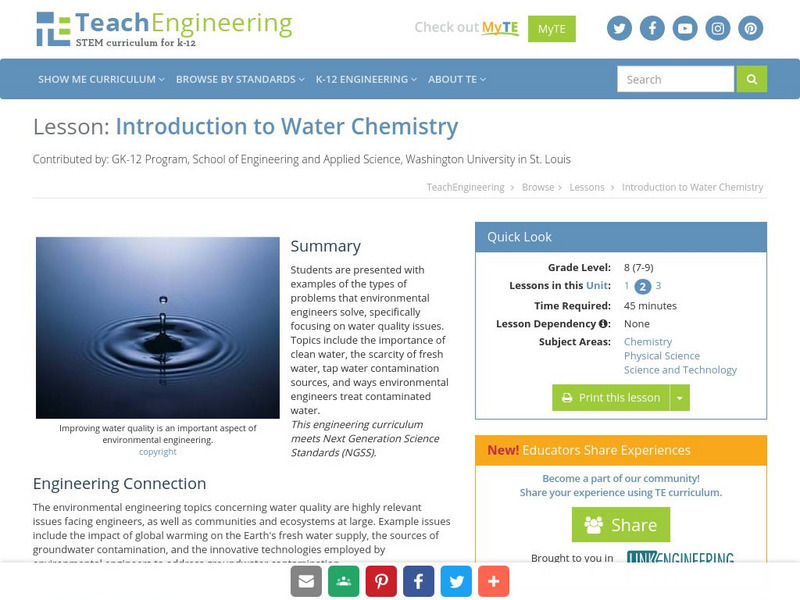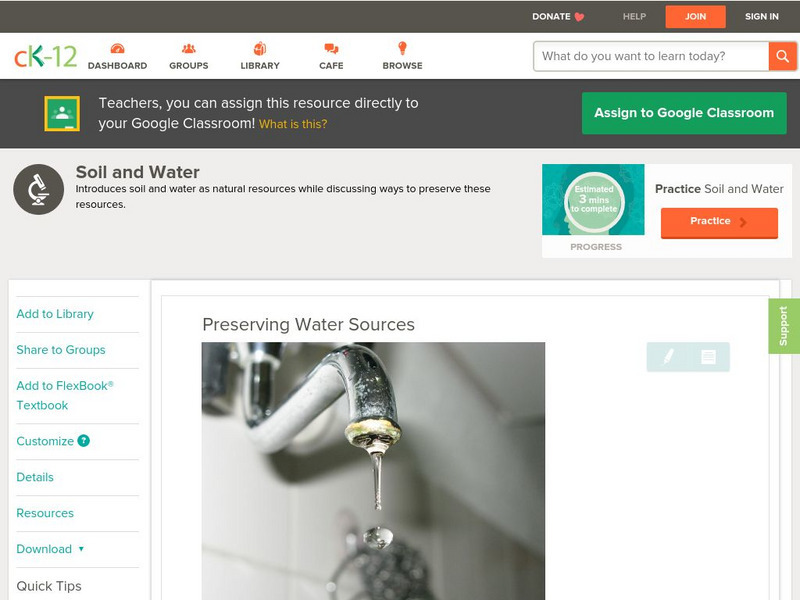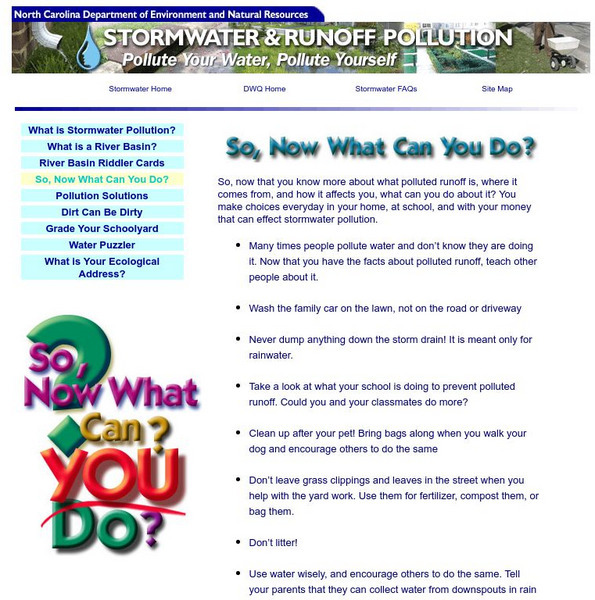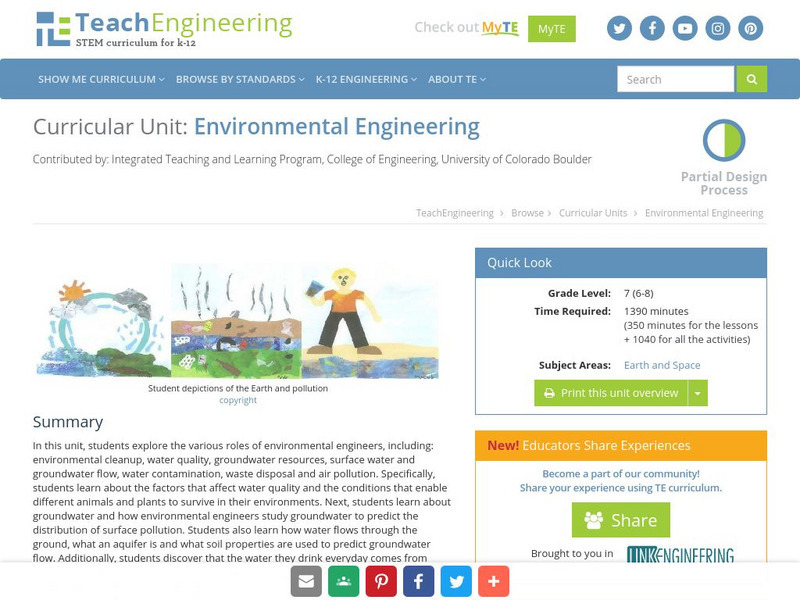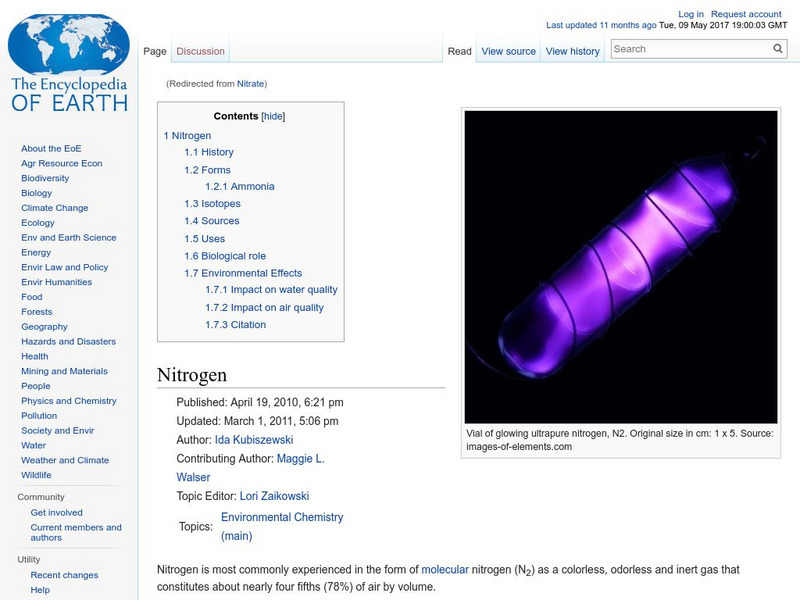Hi, what do you want to do?
BioEd Online
Bio Ed Online: Can Nutrients in Water Cause Harm?
Many different kinds of organisms live in water. Excess nutrients can cause over-abundant growth of some organisms living in water and non-point source pollution is a major threat to water supplies in the United States. In this lesson...
NOAA
Noaa: National Ocean Service Education: Nonpoint Source Pollution
Illustrated tutorial explains nonpoint source pollution and its role in the health of the environment. Students learn about different sources of pollution and how these pollutants contaminate the land, air, and water. Click on the links...
BioEd Online
Bio Ed Online: Water
The Science of Water Teacher's Guide provides a number of inquiry-based activities for grades 3-5 (although it can be expanded for other grades). The guide contains science lessons that enable students to explore water, behavior of...
Other
Nc Department of Energy and Natural Resources: What Is Stormwater Pollution
When it rains, some of the rainwater soaks into the ground, and part of it flows over the ground and directly into creeks, streams, or rivers. This water that runs off into the river is called runoff, or sometimes stormwater runoff....
Other
North Carolina Department of Energy and Natural Resources: Pollution Solutions
Try to find at least eight things in the picture that could cause litter, waste, or other pollutants to end up in the storm drain and eventually flow into nearby lakes and streams. Includes a link to an interactive page of this activity....
TeachEngineering
Teach Engineering: Introduction to Water Chemistry
Students are presented with examples of the types of problems that environmental engineers solve, specifically focusing on water quality issues. Topics include the importance of clean water, the scarcity of fresh water, tap water...
CK-12 Foundation
Ck 12: Life Science: Preserving Water Sources
[Free Registration/Login may be required to access all resource tools.] It might seem like there is plenty of water on Earth, but that's not really the case. Water is a limited resource. That means that it is used faster than it is...
Science Buddies
Science Buddies: Heavy Metals and Aquatic Environments
You might know that lead can be toxic, and that you can get lead poisoning from eating or inhaling old paint dust. Lead is called a heavy metal, and there are other sources of heavy metals that can be toxic, too. Silver, copper, mercury,...
US Environmental Protection Agency
Epa: List of Drinking Water Contaminants
Table outlines the EPA's standards for safe drinking water, defining levels of contaminants and listing possible sources of these contaminants.
HotChalk
Hot Chalk: Lesson Plans Page: Causes of Pollution
This lesson plan is designed to teach young children identify the types of pollution, the sources of the pollution, and how they can protect the environment from further pollutants.
TeachEngineering
Teach Engineering: Air Pollution
Students are introduced to the concept of air quality by investigating the composition, properties, atmospheric layers and everyday importance of air. They explore the sources and effects of visible and invisible air pollution. By...
Other
Nc Department of Energy and Natural Resources: So, Now What Can You Do?
A list of ways people can make good choices in everyday activities so as not to contribute to stormwater pollution.
TeachEngineering
Teach Engineering: What Happened to the Water? Designing Ways to Get and Clean
In this scenario-based activity, students design ways to either clean a water source or find a new water source, depending on given hypothetical family scenarios. They act as engineers to draw and write about what they could do to...
TeachEngineering
Teach Engineering: Environmental Engineering
In this unit, students explore the various roles of environmental engineers, including: environmental cleanup, water quality, groundwater resources, surface water and groundwater flow, water contamination, waste disposal and air...
US Environmental Protection Agency
Epa: Hypoxia 101
Explains what hypoxia is, its causes, the sources, why it is important to reduce it, and where it occurs around the world. Includes a diagram showing how hypoxia develops in a water body and links to lots of additional resources.
PBS
Pbs News Hour Extra: Tracking the Health Effects of Natural Disasters
Students examine the impact of natural disasters, such as flooding, on public health, and study diseases and other secondary conditions associated with stagnant water. Lesson includes resources for students to research epidemics and...
Other
John Hopkins: Researcher Dispels Myth of Dioxins and Water Bottles
This resource provides information about dioxins, water bottles, and their effects on humans.
Encyclopedia of Earth
Encyclopedia of Earth: Physics & Chemistry: Nitrate
Discusses the chemistry of nitrate, the negative agricultural effects of too much nitrate in soil and in water sources, its toxicity to plants and livestock, and the impact on human health.
Indiana University
Indiana University: Sediment Contaminants
This resource, which is part of a learning module, discusses sediment contaminants, problems associated with them, evidence of contamination, and how sediment contamination can be managed.
US Environmental Protection Agency
Epa: Polluted Groundwater Simulation
Directions for doing a simple simulation that shows how pollution spreads through groundwater sources.
US Geological Survey
Lake Pontchartrain Basin Foundation: Liquid Assets: Our Water Resources
Lessons designed to show students how water quality, water pollution, and personal lifestyle are related. Lessons help students understand the importance of our water resources and water quality. Students will explore the nonpoint and...
Other
Catawba Riverkeeper: Threats to Our Lake and Water
The most common problem on the Catawba River and its lakes is sedimentation. Sediment carried by stormwater runoff from construction sites in North Carolina has been documented as the leading source of non-point source pollution to...
US National Archives
Docsteach: Birth of the Environmental Protection Agency (Epa)
By the late 1960s, issues of unchecked land development, urban decay, and air, noise, and water pollution came to Americans' attention. In November 1971, the newly created Environmental Protection Agency (EPA) announced a large-scale...
TeachEngineering
Teach Engineering: Environment
Through 10 lessons and more than 20 hands-on activities, students are introduced to the concept of an environment and the many interactions within it. As they learn about natural and human-made environments, as well as renewable and...










